The Crackdown on Campus Protests Is Happening Everywhere
Across the US, pro-Palestine students have faced repression, suspension, and arrest. We asked more than a dozen students to share how their schools have restricted the right to protest.
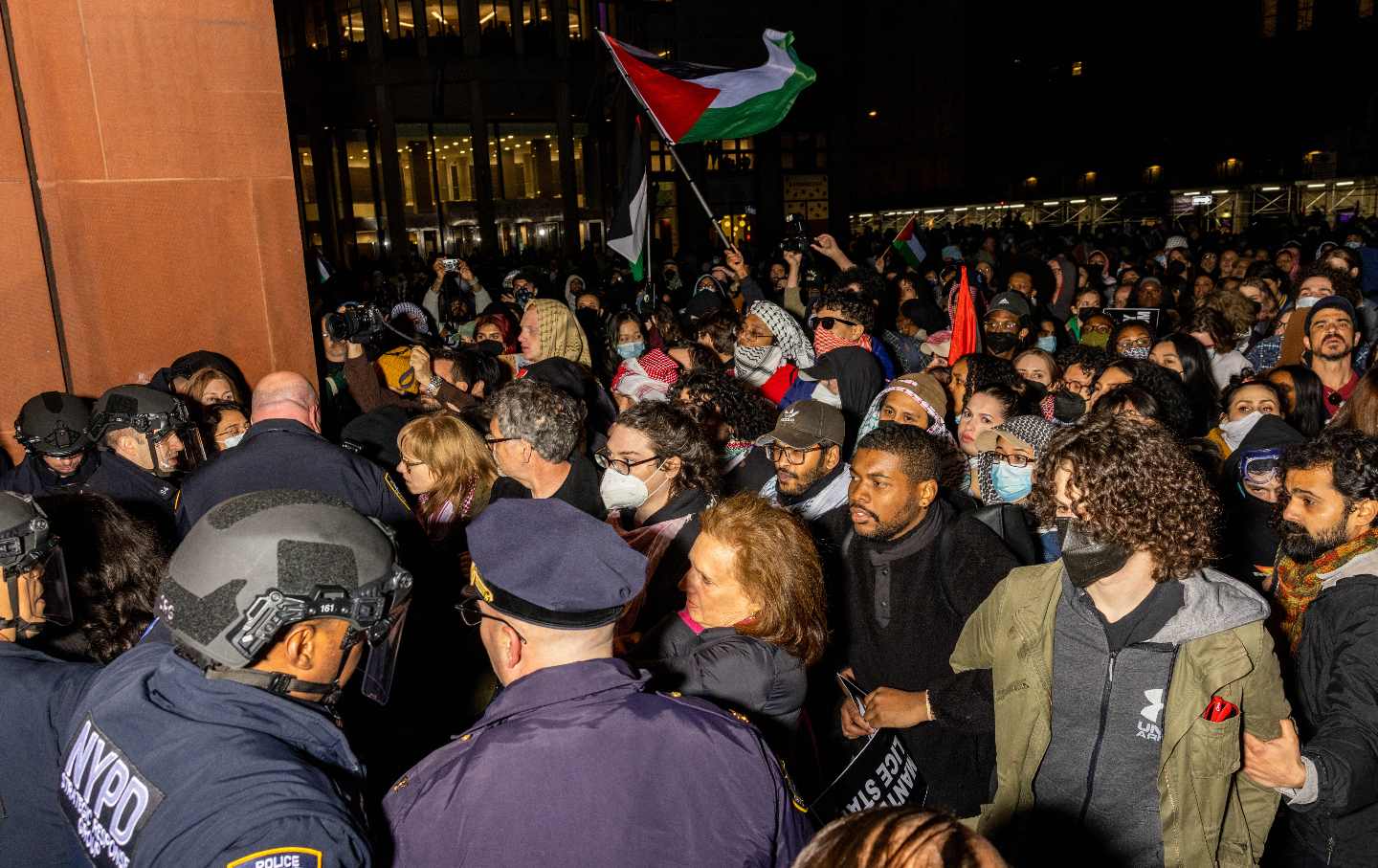
NYPD officers detain pro-Palestinian students and protesters who had set up an encampment on the campus of New York University.
(Alex Kent / Getty)On April 17, students at Columbia University formed a “Gaza Solidarity Encampment” on the campus’s East Butler Lawn calling for the school to divest from companies that profit from the occupation in Palestine. Their tents stood for two days before the administration suspended more than 100 participating students and asked the NYPD to dismantle the encampment. Unsurprisingly, the repression only increased the size and scope of the protest.
In short order, students at dozens of other colleges—including the University of Minnesota, the University of Pittsburgh, Berkeley, and Yale—have established similar encampments in a widening showdown over campus speech and the war in Gaza. Administrations are responding in different ways. On April 24, officers in riot gear at the University of Texas, Austin, blocked the path of protesters and arrested at least 34 people for refusing to disperse.
Since October, universities have suspended student groups, curbed academic speech, and called the police on peaceful protesters on campuses coast to coast. With calls for divestment only growing louder, we asked students nationwide to share how their schools have responded to protests calling for a cease-fire and in support of Palestine.
Since October 7, the Brown campus has seen a series of escalating student protests calling for the university to divest its endowment from companies that support the Israeli government. The administration has so far refused demands for divestment—and punished student protesters in the process.
In November, the university had 20 Jewish students that held a sit-in in the administration building arrested for trespassing, promising to pursue criminal charges against them. But on the eve of the students’ arraignment, the university requested that the city of Providence drop the charges. The decision was intended to ease campus tensions after a Brown Palestinian student was shot the previous weekend in Burlington, Vermont.
In December, dozens of other students held another administration building sit-in. Brown again had these students arrested and has continued to pursue charges against these students, who were arraigned in February, pleading not guilty to willful trespassing. Last month, the administration placed these students on probation, a status under which additional conduct violations by the student would be “scrutinized more heavily and sanctioned more seriously.” As part of their punishment, the students from the second sit-in were ordered to write a statement about how their actions contradicted the university’s values or create informational material about the university’s protest policy. The 20 Jewish protesters of the original sit-in were not placed on probation, but were directed to write a 10-page paper individually or as a group about the university’s divestment process.
Since the two sit-ins, the administration has repeatedly promised harsher punishments for protesters, including “more significant criminal misdemeanor charges.” On April 24, about 80 students began a tent encampment on the central campus green. In an e-mail the previous day, the administration warned that participation in encampments could result in discipline up to and including suspension from the institution. Brown’s repression of pro-Palestinian protests shows little signs of ending anytime soon.
—Nicholas Miller, Brown University
On April 22, Yale Police entered a pro-divestment encampment on campus and arrested 44 student protesters.
The arrests came one week after students began protesting on Beinecke Plaza, located at the center of Yale campus, under the name “Occupy Beinecke.” The protesters have two demands: that Yale disclose its holdings and that it divest from military arms manufacturers—most immediately any that supply weapons to the Israeli military.
The night before, some 600 people filled the plaza as organizers urged students to gather to protect the encampment. (Organizers timed the Occupy Beinecke demonstration to coincide with the semester’s final meeting of the Yale Corporation, which took place Saturday.) Protesters linked arms and encircled the collection of some 40 tents, chanting and singing “We Shall Not Be Moved.” That night, university administration offered organizers a meeting with two members of the Board of Trustees if they left and took all their belongings. Organizers, who say the university gave them 10 minutes to accept the deal, refused, saying they would not leave the plaza without a promise of disclosure or divestment.
An organizer with Occupy Beinecke, who requested anonymity out of concern for her safety, told The Nation she believes that demands for divestment at Yale are particularly important because the university’s endowment strategy holds huge influence in institutional investment. “I don’t want to attend a school that is complicit in the destruction of every school in Gaza,” she said. “And that is about Yale taking a moral stance against scholasticide.”
YPD began arresting students at 7 am on Monday. While Occupy Beinecke organizers said administration promised that there would be three dispersal or arrest warnings, police only issued one. Protesters were arrested for criminal trespassing, a Class A misdemeanor.
Adam Nussbaum, a student with Occupy Beinecke and Jews for Ceasefire, pointed to Yale’s 2018 divestment from assault weapons retailers as precedent for the divestment student protesters demand now. “It makes me deeply uncomfortable to see the disconnect between my university’s rhetoric and posturing towards growth and knowledge production, and their material connections to weapons manufacturing, which produces death in Palestine, the United States, and across the world.”
—Maggie Grether, Yale University
In an academic year in which Cornell University has boldly proclaimed “Freedom of Expression” as its central theme, the university’s actions seem to have contradicted this pledge.
Since October 7, Cornell has been a hotbed of dissent. In the weeks following, the campus witnessed a surge of protests, die-ins, and occupations of campus buildings by pro-Palestine students demanding the divestment of Cornell’s financial ties to defense contractors directly involved in the Israeli military attacks on Gaza and the West Bank.
With the onset of a new semester, Cornell administration issued a new Interim Expressive Activity policy in January, imposing stringent regulations on student demonstrations. Under the new rules, any outdoor gatherings exceeding 50 individuals on Cornell’s Ithaca campus required prior registration. The approval of the use of “amplified sound,” such as megaphones, was restricted to a narrow window of noon to 1 pm, and limited to designated areas on campus. All posters were to be dated and include the name of the sponsoring Cornell organization.
The new rules have been openly condemned by Cornell faculty senators and student assembly members alike, many of whom have called out the policy’s blatant restrictions on freedom of expression and complete lack of input from the shared structures of university governance. The backlash caused the administration to backtrack on some of its restrictions—they now “strongly encourage” prior registration for protests, for example—while others remain.
Tensions on campus show no signs of abating anytime soon. A path forward will require more than just fancy rhetoric. Concrete action is needed from Cornell’s administration, which thus far, has been passive in protecting the integrity of free speech for all of its students.
—Meher Bhatia, Cornell University
On April 22, UC Berkeley became the first college in California to establish a Gaza Solidarity Encampment. In response, university spokesperson Dan Mogulof told The Daily Californian that the university would “take the steps necessary to ensure the protest does not disrupt the university’s operations” and reiterated that “there are no plans to change the university’s investment policies and practices” through divestment.
The birthplace of the Free Speech Movement, UC Berkeley has a well-deserved reputation for student activism. It’s no surprise then that students have organized daily protests outside historic Sather Gate, calling for an end to the university’s $2 billion investment in BlackRock, which has substantial holdings in weapons manufacturers that arm the IDF.
Yet the UC Berkeley administration continues to hold pro-Palestinian protesters to a double standard.
Since October 7, Chancellor Carol Christ has released a series of statements claiming that the university’s utmost priority is freedom of expression, but the university doesn’t uphold its values when it proposes changing campus policies to hinder “disruptive” protests at Sather Gate (what is a protest if not disruptive?) or when it fails to condemn the harassment faced by pro-Palestinian student activists to the same extent that it condemns antisemitism. Also troubling was an incident after a student-led protest against a talk by Ran Bar-Yoshafat, a former member of the IDF, when UC Berkeley allowed university police to publicly release photos of individual protesters in an attempt to identify those who had allegedly “committed one or more criminal acts.”
UC Berkeley has profited enormously from its brand as an engaged home for activism and free expression. But recall that the free speech movement was launched against oppressive university policies and violently repressed by university police. The students have always fought to uphold these values—not UC Berkeley.
—Amber X. Chen, University of California, Berkeley
The Massachusetts Institute of Technology has reacted harshly to student protests supporting a cease-fire in Gaza, reflecting the institute’s long-standing ties to Israel. Since 2008, MIT laboratories have recieved millions of dollars in funding from the Israeli Ministry of Defense to conduct research in ballistics targeting, surveillance, cyberwarfare, and drone technology. The university hosts events to connect students and faculty to weapon manufacturers like Elbit, Raytheon, Caterpillar, and BAE system, who supply the Israeli military with its drones, D9 bulldozers, fighter jets, and artillery. Lockheed Martin even sponsors a $150,000 seed fund, administered by MIT, to connect students with its weapon laboratories and offices in Israel.
The institute’s response to growing calls from students and faculty to divest and adopt a clear, principled position on Palestine has been repressive. The MIT Coalition Against Apartheid (CAA), representing over 15 student groups, has held walkouts, vigils, teach-ins, and sit-ins on several occasions since October 7, most conspicuously on November 7 and February 12, when MIT students staged a sit-in. In response, administrators threatened participating students with suspension. MIT police have shut down scheduled teaching events and failed to intervene when provocateurs harass, and in some cases assault, pro-Palestine students. On February 13, president Sally Kornbluth sent a campus-wide letter formally suspending the CAA under a highly selective enforcement of rules; the CAA website was shut-down, 13 student organizers were formally sanctioned, and graduate workers were denied rights to union representation in the disciplinary process.
The MIT community has not gone down gently. On March 23, undergraduates voted by a 2-1 margin in a campus-wide referendum to call for a cease-fire in Gaza, stand with student organizers for Palestine, and cut research ties with the Israeli military. On April 19, members of the MIT Graduate Student Union voted by over 70 percent to adopt a similar resolution. Thousands have signed a “No Science for Apartheid” pledge. Starting April 21, MIT students have organized a Scientists Against Genocide encampment, vowing to continue until the MIT corporation capitulates to the majority will of its community and the demands of conscience.
—Richard Solomon, Massachusetts Institute of Technology
Unlike some other campuses, the University of Cincinnati hasn’t been overtly repressive in its treatment of pro-Palestine organizers. Instead, our environment is quietly hostile. Everyone involved in Students for Justice in Palestine (SJP) and allied organizations understands the reputational risk such affiliations pose. Faculty are reportedly worried about damaging their careers by advising the club. A colleague of mine who works for our school newspaper feared that their column would cause them to be ostracized by their peers. And while UC SJP is allowed to protest, they’re often accompanied by significant police presence.
This isn’t to say that Ohio’s government isn’t strongly opposed to pro-Palestine organizers. In 2016, Governor John Kasich signed a law that prohibited Ohio state agencies from doing business with entities boycotting Israel, and Senate Bill 83 would have banned all boycott, divestment, and sanction activity at Ohio colleges.
The suppression on campus is more subtle. It’s the feeling that makes someone not attend a SJP rally because they may lose friends, or speak out on social media because of possible harassment. It’s the second thought that causes you to remove your name from a petition. It’s the constant, unspoken fear of future repercussions: employers who won’t hire you, jobs you’ll be fired from, doors that will shut in your face—the end result of a political climate that equates advocacy with terrorism.
—Zurie Pope, University of Cincinnati
Popular
“swipe left below to view more authors”Swipe →On November 17, University of Michigan students rallied in the Diag and occupied the Ruthven Administration building that houses President Santa Ono’s office. More than 40 students were arrested after occupants were denied food, water, and access to the bathroom. When a student fainted, police delayed medics from entering. One undergraduate was thrown to the ground by campus police and had her hijab ripped off.
Less than two weeks later, President Ono authorized the cancellation of a Student Government Referendum on a resolution that called for UMich to divest. The administration lied, blaming TAHRIR—a coalition of 80 organizations fighting for divestment from Israel—for sending an “unauthorized” e-mail, though it had been preapproved by a UM staff member and followed CSG’s campaign rules. As a result, two undergraduate hijabis were doxxed.
Since then two graduate students and one Jewish undergraduate have also been doxxed. Police have visited students’ homes, once to seize electronics and sample DNA and another to retroactively issue a trespass warning for protesting the Honors Commencement just as the Black Action Movement did in 1970. One student was arrested at a regents’ meeting while entering and another arbitrarily stopped and reminded that they and 45 others face pending charges—including potential felonies—for their involvement in the protest on November 17.
Representatives of the TAHRIR Coalition have not yet had a face-to-face meeting with Santa Ono as requested. Instead, he has allowed campus police to brutalize us and enabled the active endangerment of his students.
Although not yet implemented, a “Disruptive Action Policy” was proposed and drafted that would have banned all forms of protest at the University of Michigan. The regents have assured that further crackdown will come.
—Nat Leach, University of Michigan
Since October 7, Columbia University has responded to pro-Palestine students and faculty with punitive measures like suspending Students for Justice in Palestine and Jewish Voice for Peace (an action for which the NYCLU and Palestine Legal filed a lawsuit against the school), rewriting policies about student protests, and restricting campus access to university-affiliates only, which severely inhibits students’ freedom of movement and expression.
Barnard College, an affiliate of the university, has followed suit by changing its student code of conduct, censoring pro-Palestine language from a faculty website, and banning students from putting any decorations on their dorm’s doors, a policy enacted after at least 19 students faced disciplinary proceedings for their involvement in a campus protest. In between these measures against students, pro-Palestine professor Abdul Kayum Ahmed received a letter of non-renewal after a Wall Street Journal article accused him of “political indoctrination” in the classroom, based on a video in which he labeled Israel a “colonial settler state.”
On April 4, four vocally pro-Palestine students were suspended and given eviction notices for their campus housing, seemingly in relation to an unauthorized campus event and failure to comply with university-hired private investigators. One of the suspended students, Aidan Parisi, shared with me that since receiving their suspension notice, they have not received a comprehensive file about the additional details of their suspension, nor a date on which a hearing will be scheduled to determine whether they will be welcomed back as a student or dismissed.
Despite the administration’s numerous attempts to silence student activists, on April 17, hundreds of Columbia students came together to establish their Gaza Solidarity Encampment in the center of campus—a highly visible protest meant to resemble similar actions done on campus in the 1960s over Columbia’s financial involvement in the Vietnam War. By April 18, university President Minouche Shafik requested NYPD officers to clear the encampment, leading to the arrests of over 100 students, followed by their immediate suspension. This has led to immense pushback from students, alumni, and faculty, yet the university still threatened to call the National Guard against protesting students on April 23, according to Columbia SJP.
As the protest continues and are echoed coast to coast, Columbia has been consistently hostile to the press, and on April 21, university public safety officers tried to force student radio correspondents—who have covered the protest everyday since its beginning—off the air.
—Ava Young-Stoner, Columbia University
In the fall semester, 78 percent of students voted for a Policy Against Genocide in Palestine, which would require the student union to publicly show solidarity with Palestine and lobby the university to cut ties with companies and institutions complicit in Israel’s ongoing oppression of Palestinians. The union revealed that the McGill administration pressured them to remove the referendum question, but before the university could act, an external lawsuit was filed against the student union by an anonymous student backed by B’nai Brith Canada, which is currently delaying the adoption of the policy.
McGill currently invests in companies such as Lockheed Martin, Chevron, Textron, and BAE Systems that provide Israel with military technology and advanced weaponry. Students are calling for McGill to cut ties with Israeli institutions, including ending courses that heavily subsidize students to visit Israel and work with Israeli tech startups.
Despite McGill’s resistance to address its complicity in genocide, students remain steadfast in their fight for divestment and academic boycott of Israeli apartheid. Students resorted to more disruptive tactics, such as blockading classrooms and buildings, and even starting a hunger strike. In response, McGill has publicly threatened protesting students with arrest. For the hunger strikers, McGill has largely ignored their demands and refused to meet with them. To date, two hunger strikers have already been hospitalized after refusing food for over 30 days.
—Emma Bainbridge, McGill University
Students at the City University of New York (CUNY) say that the repression they are experiencing on campus for their pro-Palestinian advocacy starts with Governor Kathy Hochul. Hochul sent a letter to university presidents across New York in December that threatened legal action against universities for failing to discipline “antisemitism and calls for genocide of the Jewish people.” Despite calling for peace, students involved with Students for Justice in Palestine at the City College of New York said that the college administration directly threatened them with suspension after Hochul’s letter.
Haderqa Arzoo, a CCNY sophomore and the vice president of the school’s SJP, says her group has faced a series of seemingly arbitrary enforcement of previously unknown school rules. During one outdoor protest in which her group was listing the names of dead Palestinians, Arzoo says that campus security arrested members of her group for using a sound system, which had never previously been a grounds for citation.
Sara Abdulaziz, a senior at Hunter College and the president of her campus’s Palestinian Solidarity Alliance, says the administration clearly stands with pro-Israel students and faculty. Her group recently held a sit-in at Hunter that was authorized by campus security, and made sure that no entrances were blocked and that students were silent and peaceful. Despite the group’s not breaking any school rules, an administration official approached her and warned her of disciplinary action. Afterward, Abdulaziz received an e-mail threatening her with suspension and consequences for her student group. Meanwhile, a Hunter professor, Tamy Ben-Tor, released a video mocking Palestinians and received no such sanctions, even as a different Hunter professor, Lisa Hoffman, was fired for tweeting that she would refuse to work with pro-Israeli faculty.
—Luca Saeed, City University of New York
At Swarthmore, pro-Palestinian protests initially went without much administrative push-back. But after a three-week-long sit-in in December—ensnaring the center of campus and disrupting tours—the administration acted quickly to establish that it would tolerate no further disruption of business as usual. The ongoing encampment, started on April 22, received a similar response of conditional tolerance and lack of support from the administration.
Participating students have been disciplined by the administration, but not at the clear level of suspension or expulsion, and faculty who moved their classes to the occupied hall received phone calls from upper administration attempting to dissuade them.
Ambiguity around what behavior is and is not allowed is widespread. Messaging changes from month to month, and students receive conduct warnings for actions that have been accepted in past protests. Emails from the president declared the chant “from the river to the sea” a “direct threat against Jews,” but administrators refused to clarify if students participating in the chant would be in violation of school rules. And for the first time, banners and posters hung on the typical campus walls were removed due to “code of conduct” violations.
Platforms for protest messaging, such as bulletin boards and social media, have been left largely open. Because of this, the language of protest has remained active since October 7. But the administration has claimed this prevalence—monthly rallies and putting up posters—as threatening to Jewish students and subject to investigation. However, others have seen it as a continuation of the school’s activist past, from the 1969 Civil Rights to the 1982 anti-Apartheid to the 2019 anti-sexual assault protests.
The administration’s response has raised questions around what acceptable protesting looks like and how committed Swarthmore is to its values of free speech and advocacy. Despite the school’s Quaker history, the administration has not shied away from criticism of nonviolent activism. For Swarthmore’s administration, peaceful protest has largely been redefined as protest which in no way interrupts the daily functioning of the institution.
— Lucy Tobier, Swarthmore College
In December, Rutgers was the first public university in the US to suspend its chapter of Students for Justice (SJP) in Palestine. While the chapter was reinstated after a massive solidarity campaign in which 150 student organizations, and dozens of community organizations, collectively denounced the decision, the administration has continued to silence calls for divestment.
The recent events surrounding the Center of Islamic Life at Rutgers University (CILRU) exemplify this. The CILRU is a private institution that serves the Rutgers Muslim community and has become a safe space for Palestinians; however, despite the CILRU’s being private property, the administration washed pro-Palestine chalkings off of its sidewalk. Just this month, a man broke into the CILRU on the beginning of Eid, vandalized a Qu’ran, and stole a Palestinian flag. When SJP planned a walkout both in solidarity with the CILRU and in support of a nationwide strike, the Rutgers administration again threatened the organization with suspension, claiming the unapproved protest “could be held accountable for disruption, damages, or violence.” The event was canceled.
While the Rutgers administration has continued to silence those who speak in support of Palestine, it has also advocated for continued “engagement, not isolation” regarding Israel—a policy that parallels the failure of the Reagan administration’s “constructive engagement” with South Africa.
By suppressing Palestinian voices, normalizing relationships with TAU and Israel, and refusing to denounce the killing of over 30,000 people in Gaza, the administration has created an environment in which the violence against Palestinians and Muslims abroad has reproduced itself on campus.
—Luke Spaltro, Rutgers University
In October, students at Stanford staged a sit-in at the school’s White Plaza in solidarity with Palestinians in Gaza. After 120 days, it became the longest sit-in protest in school history. But in February, the university issued a 12-hour notice ordering sit-in protesters to remove themselves and their belongings. More than 500 students and community members gathered to defend the camp, demanding that the university reverse its shutdown of peaceful protest. The students ultimately came to an agreement with the university to end the sit-in protest and begin negotiations, in an attempt to make Stanford call for a cease-fire and to divest from companies invested in the Israeli occupation.
But pro-Palestinian students continue to face a barrage of verbal and physical threats. In November, an Arab Muslim student was injured in a hit-and-run on the Stanford campus. The incident was treated as a potential hate crime and denounced by the university, but its other public statements have been less than consistent. In December, Stanford rightfully condemned “any calls for genocide of Jews or any other group.” What was missing—besides the identification of Palestinians in the statement—was a similar condemnation of the genocide unfolding in Gaza. The university’s rhetoric reflects a double standard in which murderous acts are recognized and criticized, unless the state of Israel is the perpetrator.
—Isaac Lozano, Stanford University
I’ve called Rice University my home for the past two years, so I never expected the level of harassment and suppression that I experienced as my residential college’s senator after introducing a resolution calling for divestment from companies complicit in the ongoing genocide in Gaza.
Two days after introducing the resolution, I received an e-mail informing me that I was under investigation for discrimination. The e-mail ordered me to “do everything in my power” to stop the vote on the resolution under threat of disciplinary consequences—all due to a complaint from a single fellow student. It has been more than three weeks since the proposal of the resolution, and yet no progress on the investigation has been made. There was popular support, and it likely would have passed had it not been tabled by the administration because of the discrimination complaint.
Over the past three weeks, I have been stalked, found racist notes left on my car, and received text messages and calls with violent threats. Rice University has given legitimacy to a hateful and violent campaign by tabling the pro-Palestine resolution—all while doing nothing to ensure the safety of organizers on campus. Rice’s administration has not responded in any way to protect me.
I am hardly the only one experiencing threats and intimidation at Rice. Fellow students have been harassed while tabling for Rice University Students for Justice in Palestine; they have been followed, threatened, and removed from club positions without support from the administration, while “discrimination” complaints are weaponized against pro-Palestine students to suppress the voice of the student body.
As a group of student advocates, our goal is peace in the form of an end to the ongoing violence abroad, in Texas, and across our nation. But in order to achieve this peace, our voices must first be heard.
—Neha Kohli, Rice University
Last November, I was called into a student conduct meeting where I was shown surveillance camera footage of myself putting up pro-Palestine flyers and received a warning from the university administration.
It’s unsurprising that tools ostensibly meant to ensure student safety—such as surveillance camera footage, swipe access data, and student conduct processes—are used by the university to police students for taping paper to a wall. Truly surprising, however, was that the university did nothing to protect the safety of pro-Palestinian students when they were harassed, stalked, or had their tires slashed. “A student followed me around a campus building for over half an hour,” said Sonal Churiwal, who coauthored a pro-Palestine divestment resolution at WashU. “I didn’t feel like I could walk across campus safely.”
Student conduct policies and violations are often wielded as a weapon of fear and intimidation by the university. WashU, like many zones of whiteness and wealth, prefers an eerie silence enforced through threats of violence over the lively harmonies of free speech.
On Tuesday, March 19, the student union at Washington University in St. Louis passed a resolution demanding that the university divest from Boeing—the largest employer of WashU alumni—given the weapons manufacturer’s role in arming the IDF. After the resolution had passed, the limit of the student union’s power over the process of divestment had been reached. But WashU Chancellor Andrew Martin rejected the possibility of divestment outright. When asked if a “divestment or unaffiliation” from Boeing could ever happen, Martin replied with a simple “no.”
The next step the community took was direct action and escalation, making our demands for divestment clear. On April 13, we began a sit-in and disruption of an admissions event, to which the administration responded with armed officers, 12 arrests, and three suspensions.
I was one of three students suspended for the crime of speaking out against our university’s continued complicity in genocide, and now I’m banned from campus under the threat of arrest.
—Daniel Cázares, Washington University in St. Louis
More from The Nation
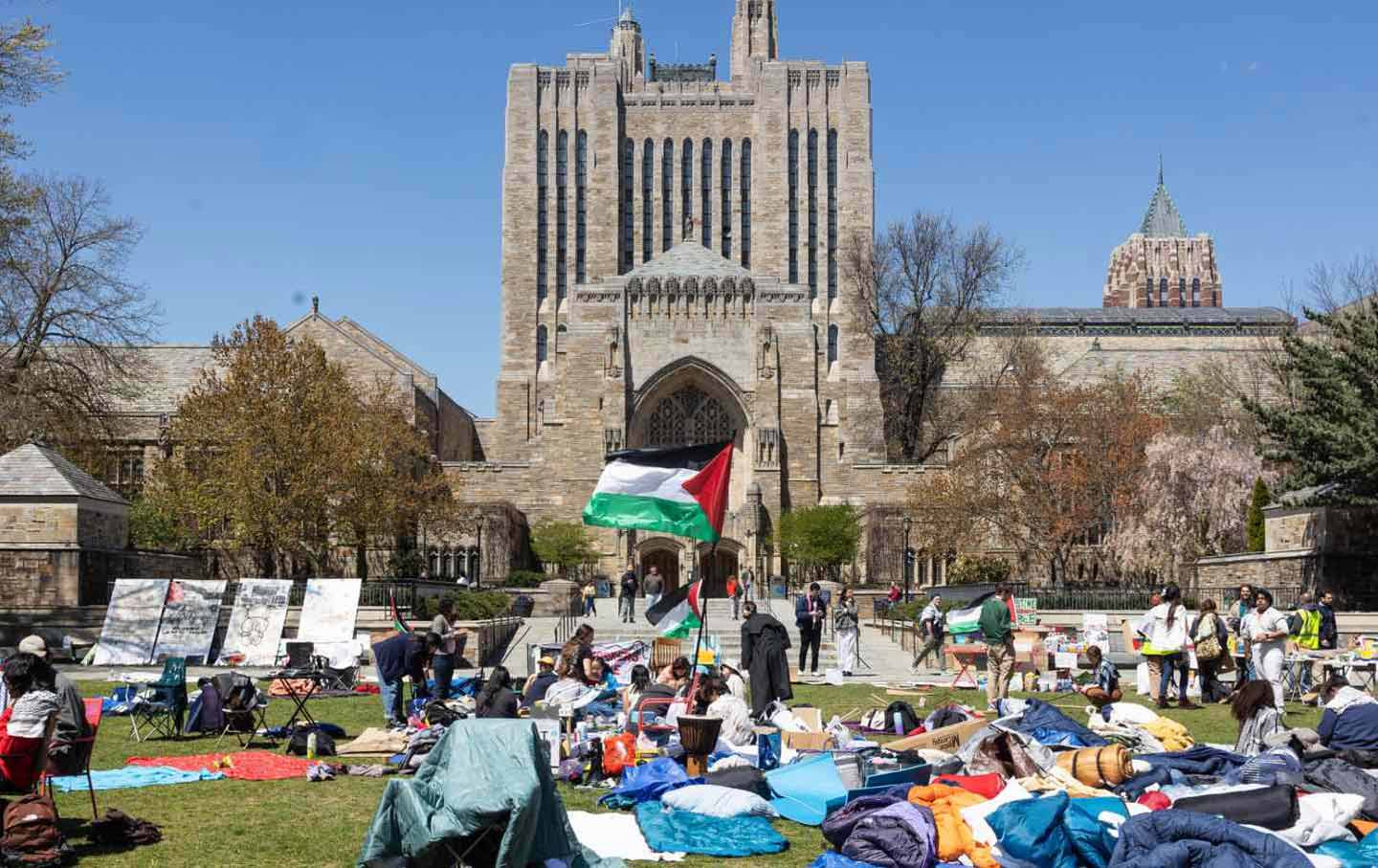
Yale Students Voted to Divest, but What’s Next is Unclear Yale Students Voted to Divest, but What’s Next is Unclear
The referendum calls on the school to divest its $41 billion endowment from military weapons manufacturing firms, yet the power to do so is in the hands of the board of trustees.
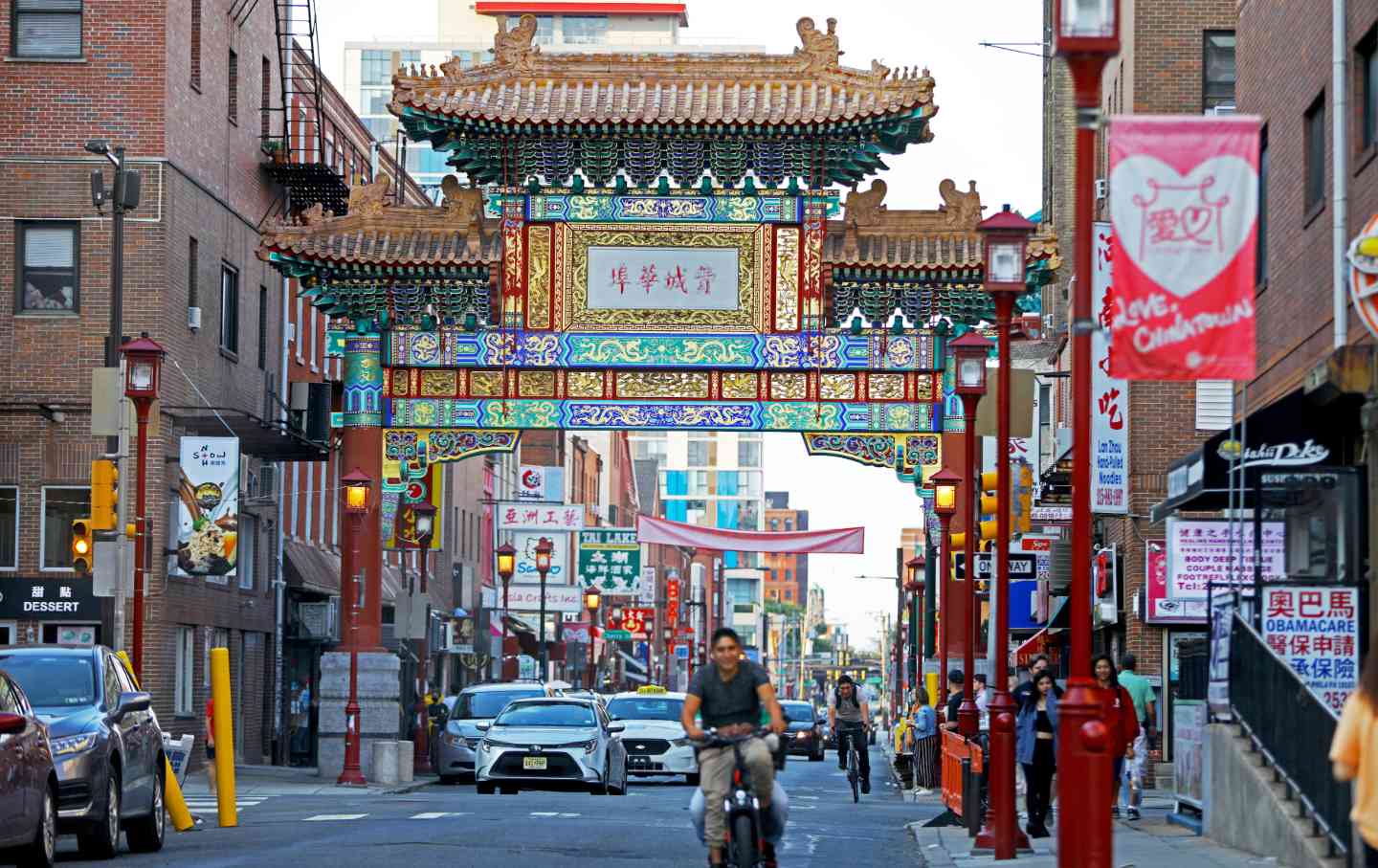
The “Save Chinatown” Coalition Goes on the Defensive in Philadelphia The “Save Chinatown” Coalition Goes on the Defensive in Philadelphia
The construction of a new basketball arena threatens to fill the neighborhood with more traffic and raise rents.

Human Rights for Everyone Human Rights for Everyone
December 10 is Human Rights Day, commemorating the anniversary of the Universal Declaration of Human Rights (UDHR), one of the world's most groundbreaking global pledges.
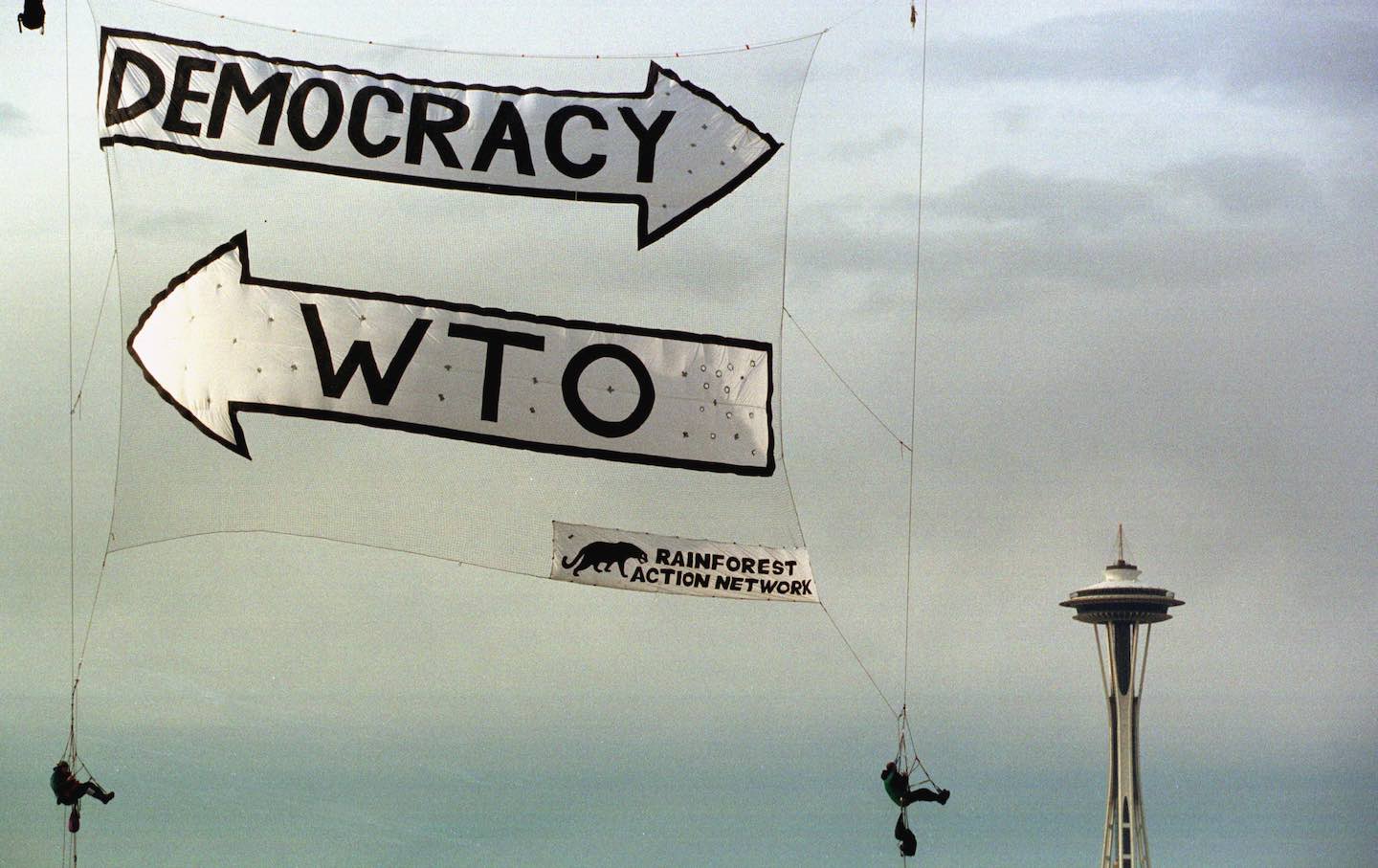
25 Years Ago, the Battle of Seattle Showed Us What Democracy Looks Like 25 Years Ago, the Battle of Seattle Showed Us What Democracy Looks Like
The protests against the WTO Conference in 1999 were short-lived. But their legacy has reverberated through American political life ever since.
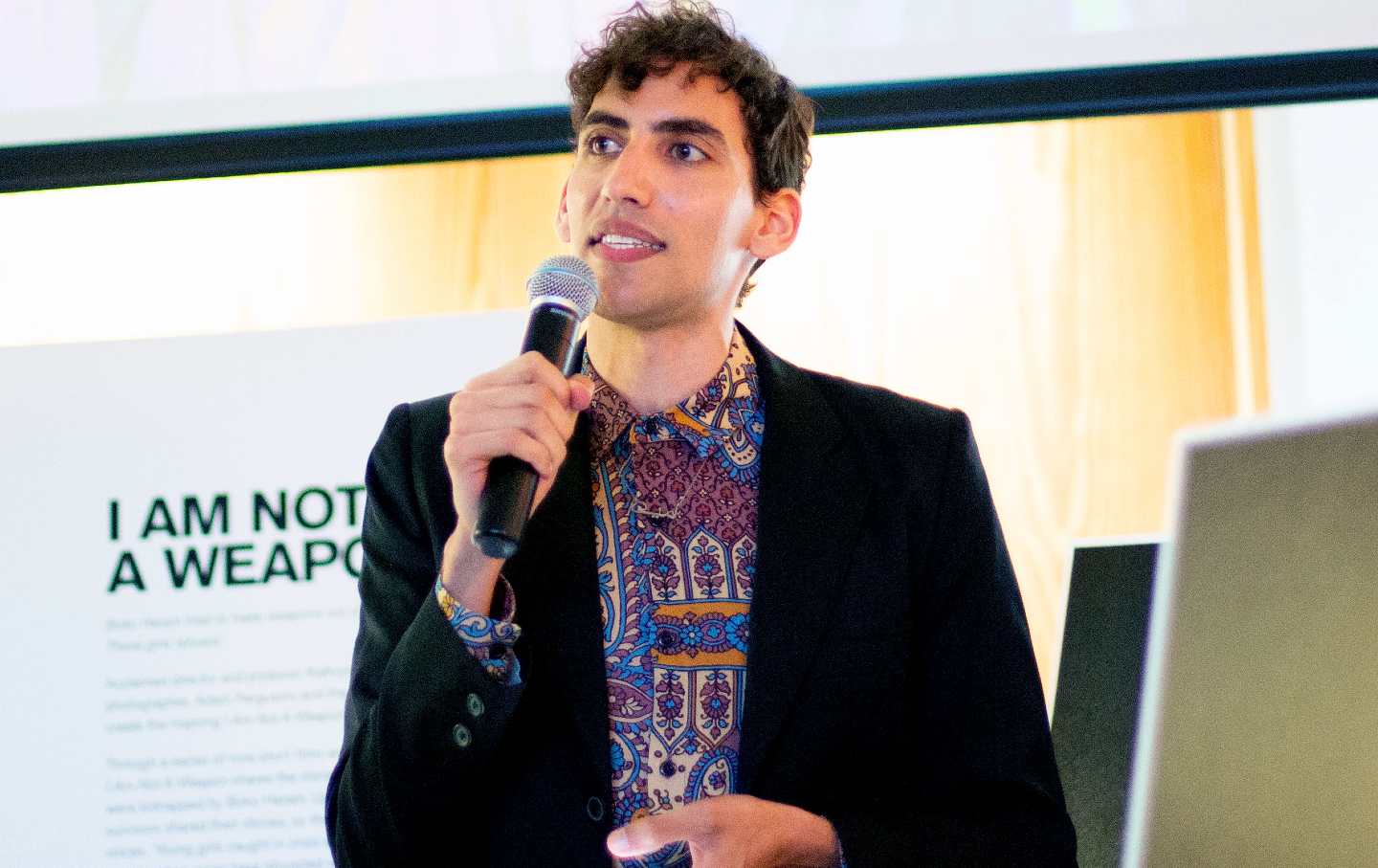
Hollywood’s Vocal Actors Union Goes Silent on a Gaza Ceasefire Hollywood’s Vocal Actors Union Goes Silent on a Gaza Ceasefire
Amin El Gamal, head of SAG-AFTRA's committee on Middle Eastern and North African members, has advocated for a statement supporting a ceasefire in Gaza—so far without success
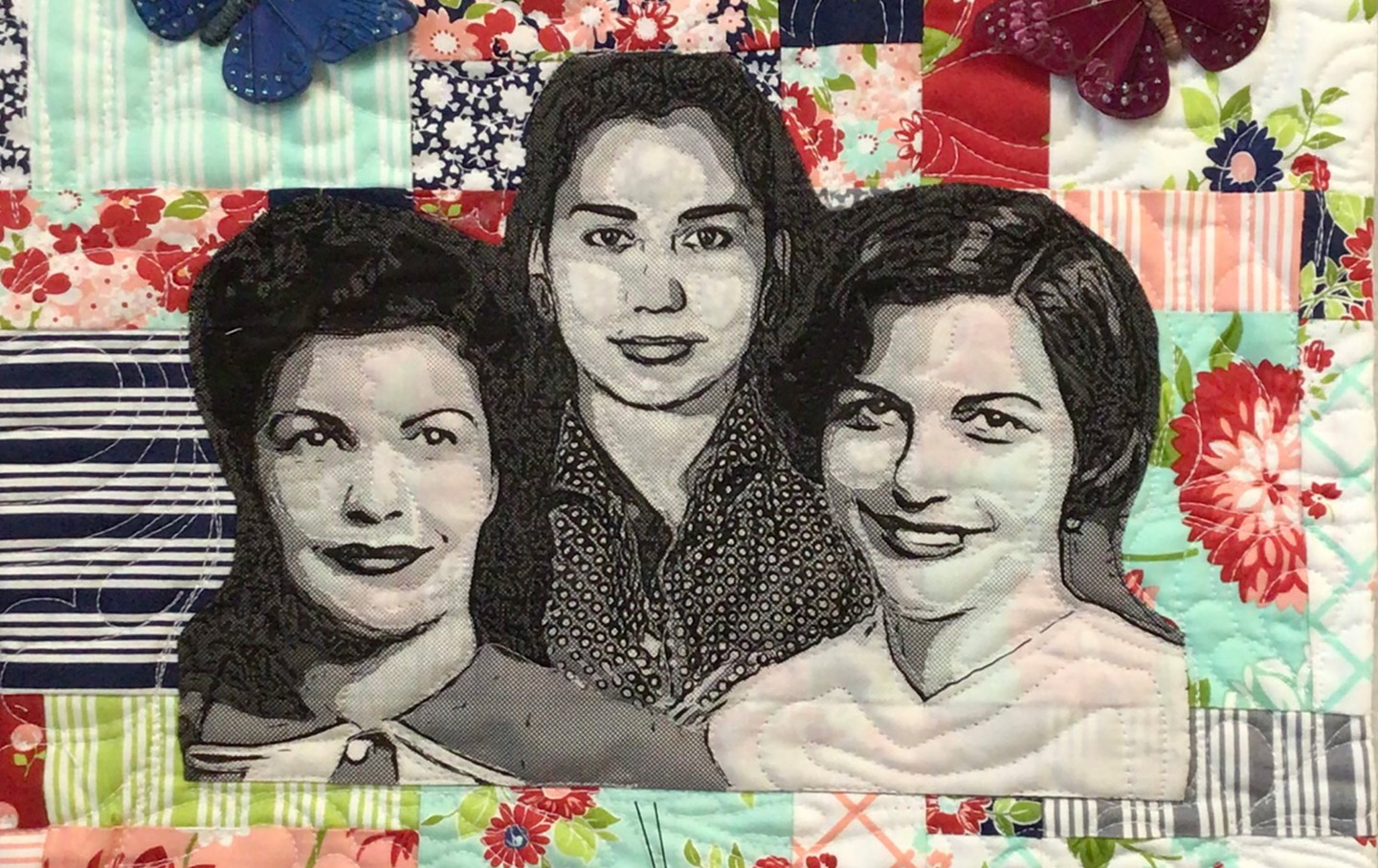
The Mirabal Sisters The Mirabal Sisters
Patria, Minerva, and María Teresa Mirabal were sisters from the Dominican Republic who opposed the dictatorship of Rafael Trujillo; they were assassinated on November 25, 1960, und...


